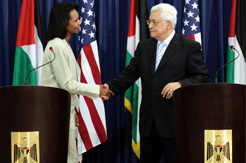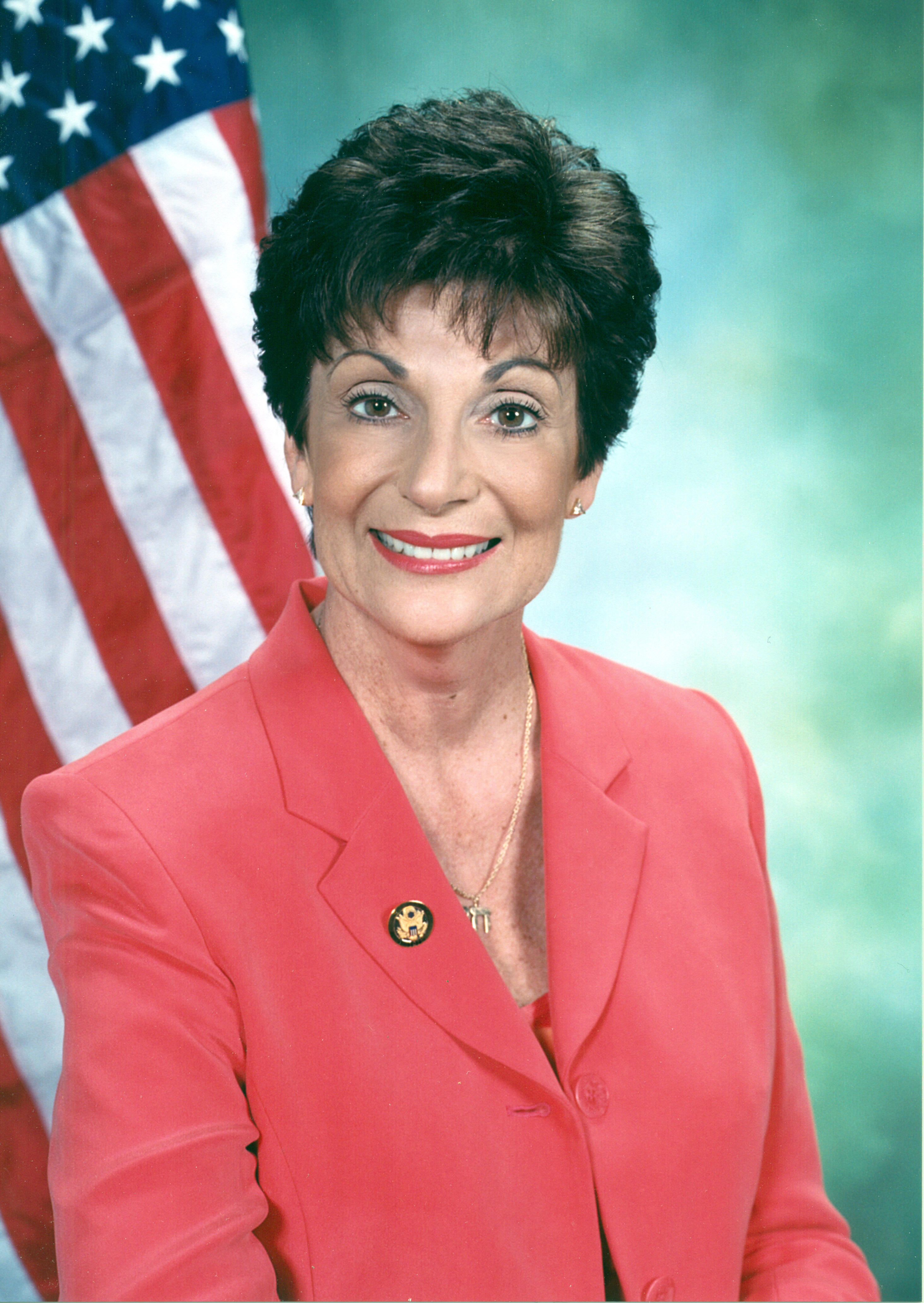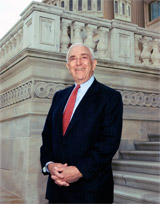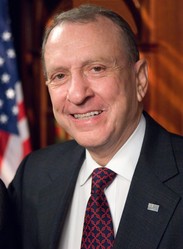|
San
Diego Jewish World
Thursday Evening ,
August 2, 2007—Friday, August 3, 2007
Vol. 1, Number
94





Condoleezza Rice, Mahmoud Abbas
Anthony Weiner
Shelley Berkley
Frank Lautenberg
Arlen Specter
Rice: Olmert and Abbas should 'deepen' dialogue;
Abbas: Hamas must restore status quo ante
RAMALLAH, Palestinian Authority (Press Release)—Following is the transcript of a
joint press conference by President Mahmoud Abbas of the Palestinian
Authority, and U.S. Secretary of State Condoleezza Rice.
PRESIDENT ABBAS:
(Via interpreter) In the name of God, the Merciful, the Compassionate, once
again we welcome Dr. Rice, and we thank her for her visit to us and we assert to
her that we were and still are and we will always be seeking for peace that is
just and this peace in this region, peace that is based on a two-state solution,
the Palestinian independent state which is contiguous and the state of Israel
that lives side by side with Palestine safely and securely.
Today, we
speak about several issues that are of interest regarding the conditions that
have emerged following the call that took place in Gaza, the economic situation,
the financial and the security situation in the West Bank and about means of
moving forward with the peace process.
|
San Diego Jewish World—August
2, 2007
(click on headline below to jump
to the story)
Israel and Middle East
Rice: Olmert and
Abbas should 'deepen' dialogue;
Abbas: Hamas must restore status quo ante
One hundred
fourteen Congress members oppose Saudi arms deal in letter to Bush
U.S. to block the
assets of any person or group
found to be attempting to destabilize Lebanon
Olmert to Saud: Israel also
interested in 'serious and meaningful' discussions at international meeting
Peres Diary:
President visits
Jewish, Arab communities in Galilee
U.N. says Gaza economy
continues to deteriorate
Bill inspired by
1983 Marine barracks bombing in
Beirut would permit victims to sue terrorist nations
Europe
Israel to
help Macedonia battle wildfires
Touring Jews break into
Majdanek, pay damages
Asia
Davis co-sponsors
legislation to encourage American students to learn Chinese
United
States of America
NJDC slams
Romney for praising Hezbollah
Hadassah will
cosponsor 'stem cell summit'
JINSA advisor to head JFK
Airport security
AJC says high fuel
efficiency requirements are necessity for promoting energy
independence
Reform Judaism's
Saperstein, NCJW press Senate to pass bill providing children's health
coverage
National
Council of Jewish Women praises House vote
Features
News Sleuths:
Rice sees
'a new kind of hope' in Middle East
Jewish Grapevine
Greater San Diego area
Local Christians, Jews
contribute to repair of Israeli schools
Sports
In midst of
Vick case, Rep. Ackerman offers
legislation to toughen dog fighting penalties
Congresswoman Berkley says
investigation should continue into Tillman's death circumstances
Tel Aviv's Prebble shuts out
Bet Shemesh Blue Sox
Arts & Entertainment
Book Review: What
turned Adolf Eichmann into a murdering Nazi?
|
However, today
we have a project which will be signed today in order to revive and develop the
security services. This project which is supported by the United States, I would
like to point out here that we, two weeks ago, we signed another agreement with
OPIC to provide fast loans for all who want to invest as small enterprises and
we hope that economic conditions will develop and improve and the political
conditions will also improve hence. And based on this, we will continue in our
pursuit and our work.
We do not look
right or left. We want to reach an independent state. We want to reach with our
people to stability and good living economic conditions and to end the security
disorder and the unstable security conditions so that the (inaudible) feels that
(inaudible) lives in a safe homeland. And welcome, Dr. Rice.
SECRETARY RICE: Thank you very much, Mr. President. Thank you for
welcoming me back. I have had very good discussions in the region, and yesterday
in Israel in (inaudible). I came this time to pursue the initiatives that
President Bush announced in his July 16th statement about the
importance of recommitment and movement forward on the creation of two states
living side by side in peace and freedom.
Mr. President,
I think that everyone is impressed with the leadership that you have been
showing, impressed with the work of your government under Prime Minister Salam
Fayyad, and there is a great desire to be supportive of the Palestinian people
as they make these efforts to lay a foundation for a stable, prosperous, and
democratic Palestinian state.
I want to note
that we will have a discussion about the political discussions that you are
having on a bilateral basis with Prime Minister Olmert. The Prime Minister said
to me that he looks forward to continued discussions with you and that he is
ready to discuss the fundamental issues that will lead to negotiations soon for
the creation of a Palestinian state. And I know that that is your desire too,
and the United States wants to support that bilateral track. |
|
We will also
have a discussion of the international meeting that the President intends to
call of those states that are devoted to the two-state solution so that we might
provide international support and regional support for your bilateral efforts.
I am looking
forward today to signing with Prime Minister Fayyad the $80 million assistance
package for Palestinian security. This allows us to give a quick infusion of
funds to security reform here that is consistent with a broader international
effort to reform and professionalize the Palestinian security forces because, as
you have said, rule of law and security are at the core of being able to have
functioning government, to have functioning opportunities for your people. And
this is first and foremost so that your government can provide security to the
Palestinian people and, on that basis then, to be able to provide regional
security.
And so I look
forward to the signing of this document. Thank you for taking note of the OPIC
arrangements that were signed a few days ago. And I think you can be certain
that the American people want to be a good and committed partner of the
Palestinian people as we move to realize the vision of two states living side by
side in peace and freedom.
Thank you,
sir.
PRESIDENT ABBAS: (In Arabic.)
SECRETARY RICE: Oh, fine. Yes, we’re going to go to – fine, and we’ll
come back and take Q&A.
(The Signing
Ceremony for the Framework Agreement on Security Assistance takes place.)
(Applause.)
QUESTION:
(Via interpreter) Your Excellency (inaudible), the U.S. President George Bush
asked for in the region an international conference and most Arab countries
expressed their support of the meeting. What is the nature of this meeting and
will there be any declarations or visions coming out from this meeting for the
final status solution, especially that Israeli Prime Minister Olmert still
believes that the time has not come yet for getting involved into -- seriously
into final status negotiations according to the statements that he has given
yesterday following your meeting with him? Thank you.
(Jump to continuation)
One hundred fourteen Congress members oppose Saudi arms deal in letter to
Bush
WASHINGTON
DC (Press Release)
-
The opposition in Congress to a proposed sale of high technology armaments to
the Kingdom of Saudi Arabia is growing amid new reports of Saudi Arabian
intransigence in the region such as insisting on preconditions for a meeting
with Israel, and the refusal to do more to prevent terrorists from crossing into
Iraq from Saudi Arabia.
Today, a
broad bipartisan coalition of over 100 members of Congress, led by Democratic
Reps. Anthony Weiner of New York, Shelley Berkley of Nevada, Marcy
Kaptur of Ohio, Barbara Lee of California and Republican Reps. Mike Ferguson of
New Jersey, Virgil H. Goode Jr. of Virginia, and Walter Jones of North Carolina
released a letter to President Bush expressing their deep opposition to the sale
and said they intend to vote to stop it. Earlier this week, 14 members of the
House of Representatives announced they will introduce a Joint Resolution of
Disapproval to block the sale “the minute Congress is officially notified” of
the sale, which is expected to take place this September…
Saudi
Arabia has not been a true ally in the war on terror or furthering the United
States interests in the Middle East. Today it was reported that the Kingdom is
insisting on a preconditions for a meeting with Israel and gave little ground
during the administration’s effort to step up efforts to halt Saudis intent on
joining the insurgency in Iraq from crossing the border or traveling through
Syria. Prince Saud was quoted as saying, “All that we can do in order to protect
the border in Iraq we have been doing.”
But just
last week, American officials in Iraq said the majority of suicide bombers in
Iraq are from Saudi Arabia and that about 45 percent of all foreign fighters are
Saudi. Iraqi media reported that students at the Muhammad Ibn Saud Islamic
University, located in Riyadh and known as the "terrorist factory," has
organized activist groups and sent members streaming north to join the onslaught
on Iraqi Shias. Brig. General Kevin Bergner, the top American military spokesman
in Iraq detailed an account of a Saudi Arabian smuggled into Iraq to be a
suicide bomber… (Jump
to continuation)
(Return to top)
U.S. to block the assets of any person or group
found to be attempting to destabilize Lebanon
WASHINGTON, D.C (Press Release)—President Bush sent a notice to Congress today
about his executive order blocking assets of any person or group seeking to
overthrow the legitimate elected government of Lebanon. The text of that
letter follows:
TO THE CONGRESS OF THE UNITED STATES
Pursuant to the International Emergency Economic Powers Act, as amended (50
U.S.C. 1701 et seq.)(IEEPA), I hereby report that I have issued an Executive
Order declaring a national emergency to deal with the threat in Lebanon posed by
the actions of certain persons to undermine Lebanon's legitimate and
democratically elected government or democratic institutions, to contribute to
the deliberate breakdown in the rule of law in Lebanon, including through
politically motivated violence and intimidation, to reassert Syrian control or
contribute to Syrian interference in Lebanon or to infringe upon or undermine
Lebanese sovereignty, contributing to political and economic instability in that
country and the region. Such actions constitute an unusual and extraordinary
threat to the national security and foreign policy of the United States.
This order will block the property and interests in property of persons
determined by the Secretary of the Treasury, in consultation with the Secretary
of State, to have taken, or to pose a significant risk of taking, actions,
including acts of violence, that have the purpose or effect of undermining
Lebanon's democratic processes or institutions or contributing to the breakdown
of the rule of law in Lebanon, supporting the reassertion of Syrian control or
contributing to Syrian interference in Lebanon, or infringing upon or
undermining Lebanese sovereignty. The order further authorizes the Secretary of
the Treasury, in consultation with the Secretary of State, to block the property
and interests in property of those persons determined to have materially
assisted, sponsored, or provided financing, material, logistical, or technical
support for, or goods or services in support of, such actions or any person
whose property and interests in property are blocked pursuant to the order; to
be a spouse or dependent child of any person whose property and interests in
property are blocked pursuant to the order; or to be owned or controlled by, or
to act or purport to act for or on behalf of, directly or indirectly, any person
whose property and interests in property are blocked pursuant to the order.
I delegated to the Secretary of the Treasury, in consultation with the Secretary
of State, the authority to take such actions, including the promulgation of
rules and regulations, and to employ all powers granted to the President by
IEEPA as may be necessary to carry out the purposes of my order.
I am enclosing a copy of the Executive Order I have issued.
GEORGE W. BUSH
(Return to top)
Olmert to Saud: Israel also desires 'serious and meaningful' discussions at
international meeting
JERUSALEM (Press Release)—The following statement was issued by the office of
Israel’s Prime Minister Ehud Olmert following a
news
conference by Saud Al-Faisal, Saudi Arabia’s foreign minister, with U.S.
Secretary of State Condoleezza Rice and U.S. Defense Secretary Robert Gates:
Prime Minister Ehud Olmert closely followed the statement of the Foreign
Minister of Saudi Arabia, Prince Saud Al-Faisal, after his meeting with
Secretary Rice, regarding the International Meeting to be held in the fall.
Prime Minister Olmert shares the same approach, that the International Meeting
will be serious and meaningful, and he welcomes the participation of leaders of
Arab countries in the meeting.
The preceding
story was provided by the office of Prime Minister Ehud Olmert
(Return to top)
|
 |
The Peres Diary |
 |
President visits
Jewish, Arab communities in Galilee
KIRYAT SHEMONA, Israel (Press
Release)—The President of Israel, Mr. Shimon Peres, to the Citizens
of Kiryat Shemona on Monday, July 30: “From the Residence of the
President I will continue to deal with the development and strengthening
of the Galilee”
The President of Israel, Shimon Peres, chose to open his first working
visit in the Galilee on Monday, 30th July 2007. The President visited
Kiryat Shemona, met with the Mayor, with the Heads of Councils in the
Galilee and with pupils and students, who warmly congratulated him on
his election as President.
The President, moved by the compliments and warm reception, stated that
the uppermost purpose of developing and strengthening the Negev and the
Galilee has maintained its importance for him and that he will continue
to act on behalf of the inhabitants of the Galilee – both the Jews and
the Arabs, also from the Residence of the President.
The President added that today he salutes the inhabitants of Kiryat
Shemona and the Galilee for their steadfast position during the war.
“You showed courage and maturity and all the citizens of the State of
Israel owe you deep gratitude.”
Aharon Valenci, the Head of the Upper Galilee Regional Council, stated
from the platform that the entire north and the Galilee need a strong
and respected President such as President Shimon Peres. “I know that you
have many projects for us and I am sure that you will continue to act
with full energy also from your new residence.”
At the end of the ceremony of congratulations, the President requested
to meet the new students who had settled in Kiryat Shemona through the
Ayalim organization which aims at advancing the children of the city and
their education and turning the “Olei Hagardom” neighborhood into an
active and lively vicinity.
The students welcomed the President with the singing and dancing of the
neighborhood children and the President announced that in this
neighborhood he feels the new pioneering spirit of the 21st century.
After the meeting the President arrived at Tuba Zanagriah and was
received by Husein El Hayeb – the Head of the Council, who opened the
event and said that he is moved to host the President of Israel, Mr.
Shimon Peres, in his home and that he is proud that at the head of the
State of Israel stands a man who is so respected and full of merits, who
is continuously acting to attain peace in the Middle East and full
equality between Jews and Arabs.
The President said that, “without peace there will be no good in the
Middle East and without equality there will be no good in the State of
Israel.”
The President ended his first working visit in the Galilee by opening
the Dance Festival in Carmiel.
The preceding story was provided
by the office of Israel's President Shimon Peres
(Return to top)

U.N. says Gaza economy continues to
deteriorate
UNITED NATIONS, N.Y. (Press Release)–
The economy of the Gaza Strip continues
to deteriorate as a result of the limited opening of border crossing points into
the territory, the United Nations said today.
According to the UN
Office for the Coordination of Humanitarian Affairs (OCHA), the vast majority of
import-dependent industries – notably the wood, construction and garment sectors
– have temporarily closed down.
In addition, only 10
per cent of Gaza’s industries, those depending on previously stored raw
materials, remain partially functional.
Total losses since
the closure of the Gaza crossings in mid-June is now reaching $23 million, OCHA
says, with an average daily loss of about half a million dollars.
The Office also
reports that, on Sunday and Monday, 414 Palestinians who were stranded in Egypt
for 51 days returned to Gaza through the Nitzana and Erez crossings, and
additional returns to Gaza are planned in the coming days.
Drawing attention to
the situation on the ground, Secretary-General Ban Ki-moon stated recently that
“the continued restrictions on Gaza will have a severe humanitarian impact and
can only cause further suffering to the people there.”
Likewise, UN
humanitarian officials have warned that the restrictions are threatening the
economic sustainability of the territory, where more than 1.4 million live in a
360-square-kilometre area.
(Return
to top) |
Bill inspired by 1983 Marine barracks
bombing in
Beirut would permit victims to sue terrorist nations
WASHINGTON, D.C. (Press Release) – Sen. Frank R. Lautenberg
(Democrat, New Jersey) and Sen. Arlen Specter (Republican,
Pennsylvania) today led a strong bipartisan coalition of Senators
introducing legislation to give victims of state-sponsored terrorism their
day in court.
“Far
too many Americans have suffered at the hands of terrorism. My bill would
allow victims of state-sponsored terror to have their day in court. It
would let victims sue countries and hold those countries accountable,” said
Sen. Lautenberg.
“I am
pleased to cosponsor this legislation which gives the victims of terrorism
and their families the ability to seek legal redress,” said Sen. Specter.
“This bill reaffirms that the United States will not tolerate state
sponsored terrorism.”
The bill would allow victims of state-sponsored terror to sue countries that
promote terrorism. The measure would allow victims to seize hidden
commercial assets for compensation.
“This
legislation is important to the families of the victims of the 1983 Marine
Barracks bombing in Beirut, Lebanon. It will hold the government of Iran
accountable for the murder of 241 men in this bombing, one of whom was my
brother, Captain Vincent L. Smith (United States Marine Corps).
“The injustice of this over the long years has been a heavy burden -- the
Iranian government has literally been getting away with murder for almost 24
years. The passage of this bill will bring justice by holding the criminals
accountable for their crime. And I believe it will mitigate future
terrorism. This bill is a huge statement of support for victims of
terrorism, and a powerful way to fight terrorism without the use of military
force,” said Lynn Derbyshire, who serves as the national spokesperson for
The Beirut Families.
The
legislation -- the Justice for Victims of State Sponsored Terrorism Act --
is based on a 1996 amendment to the Foreign Sovereign Immunities Act known
as the Flatow Amendment, which enabled American victims of terrorism to go
after state sponsors of terrorism in court. The bill would:
The
measure has an impressive bipartisan list of original cosponsors,
including Democratic Senators Joseph Biden of Delaware, Hillary Clinton of
New York, Dianne Feinstein of California, Charles Schumer of
New York and Robert Casey of Pennsylvania; Independent Senator Joe
Lieberman of Connecticut, and Republican Senators Trent Lott of
Mississippi, John Cornyn of Texas, Norm Coleman of Minnesota, Susan
Collins of Maine and Ted Stevens of Alaska.
The
preceding story was provided by the office of U.S. Sen. Frank Lautenberg
.
Israel to help Macedonia battle wildfires
JERUSALEM (Press Release)—The
Ministry of Foreign Affairs has decided to send aid to the Republic
of Macedonia to help in its battle against the extensive fires
rampant in the country, caused by the extreme heat wave that has
swept over Southern Europe in the past few days.
Upon receipt of the Macedonian
government's appeal to neighboring friendly governments for
assistance in extinguishing the fires, Vice Prime Minister and
Minister of Foreign Affairs Tzipi Livni and MFA Director-General
Aharon Abramovitch responded immediately, making Israel one of the
first countries to send emergency assistance. Israel will supply
Macedonia with protection kits for firefighting and rescue
personnel, breathing kits and high-temperature firefighting suits.
The Republic of Macedonia
(formerly the Republic of Yugoslavia) is a small country with a
population of about two million. The country has relatively low
resources, and since gaining independence has been contending with
difficult challenges in an attempt to stabilize a free market
economy and to integrate itself into the European Region and to
NATO.
Macedonia is currently
struggling to promote and implement economic and social reforms and
to strengthen its democratic system of government. The Macedonian
government is partly comprised of young leaders who returned to
their homeland after completing their studies in the West with the
aim of assisting in the transition from a Communist system of
government to a legislative democracy, and in making the country
attractive to foreign investors.
Macedonia has been a staunch
supporter of Israel in international forums since the establishment
of diplomatic relations in 1995, expressing solidarity at every
opportunity. Branko Crvenkovski, former Prime Minister of the
Republic of Macedonia, visited Israel in 2005 and was the last
foreign head of state to meet with Prime Minister Sharon before his
illness. Several Israeli companies operate in the Macedonia,
predominantly in the nutritional and electronic fields.
The preceding story was provided by
Israel's Ministry of Foreign Affairs.
(Return to top)
Touring Jews break into Majdanek, pay damages
LUBLIN, POLAND (Press Release)—A group of ultra-Orthodox Jews
resorted to breaking into the site of the former Nazi concentration
camp Majdanek. The group was trying to gain access after visiting
hours to what is now a museum. A bus with 35 Chassidic Jews from
Israel and the United States who were coming from Ukraine to Poland
arrived at the museum after 6 p.m., the end of visiting hours.
Some of the group members unhinged the gate and removed a padlock on
the door of one of the barracks, according to Polish media reports.
“The entire incident was a misunderstanding,” Lublin police
spokesman Witold Laskowski told Poland's TVN24 news channel, who
said the visitors apologized for their behavior. “The Jews agreed to
cover the costs of the damage of about US$ 400 and will shortly
continue their trip.”
"I have worked here for 12 years, the museum is visited by 80,000
visitors annually, but I have never seen anybody breaking in to
visit the place before," Grzegorz Plewik, deputy director of the
museum, told the PAP news agency. Some 250,000 to 360,000 people,
mostly Jews, were killed by the Nazis at Majdanek, which is on the
outskirts of the city of Lublin.
The preceding story was provided by the World Jewish Congress
(Return to top)
Davis co-sponsors
legislation to encourage American students to learn
Chinese
WASHINGTON, D.C. (Press Release)—To meet the
challenge as China becomes a global competitor and
partner,
Congresswoman Susan Davis (Democrat,
California) introduced legislation to overcome the
language and culture barriers between future
generations of Americans and Chinese.
The U.S.-China Language
Engagement Act sets out to increase Chinese cultural
studies and language acquisition for school-aged
students of the United States through grants to
Local Education Agencies (LEAs). The grants, given
on a competitive basis, will carry out innovative
model programs for Chinese language and cultural
studies in elementary and secondary schools.
“It is little news to
anyone that China is on the rise,” said Davis, a
member of the U.S.-China Working Group. “Some may
view China’s resurgence as a threat. But we must
turn China’s rise into an opportunity for United
States citizens. Through careful diplomacy, I
believe China can become not only a competitor but
also a partner.”
China is now the U.S.’s
second largest trading partner and continues to rise
as an economic and political force in the world.
However, little understanding exists between the two
nations culturally and there is little dialogue
between citizens. Chinese or Mandarin is spoken
almost exclusively within Chinese-American
communities in the United States and few Americans
learn the language.
While an estimated 200
million Chinese school children are studying English
and American culture, less than 50,000 American
elementary and secondary students are studying
Chinese.
Funding for the
U.S.-China Language Engagement Act is authorized at
$20,000,000 in 2008 and $25,000,000 for fiscal years
2009 through 2012.
Davis’s bill is part of
a larger legislative package on U.S-China
competitiveness. Bills addressing trade, diplomacy,
and energy were introduced by U.S. Reps. Rick Larsen
(Democrat, Washington), Mark Kirk (Republican,
Illinois), and Steve Israel (Democrat, New
York).
|
Dear Readers,
Along with my husband Don, I co-publish
San Diego Jewish World. As a couple we have gone to many
places. Cruising ranks at the top of our list of favorite ways
to travel.
Watch this ad for a
different cruising photo each day. A similar adventure can be yours!
America's
Vacation Center, with which I'm
affiliated, is a multi-branched travel agency that is able to
provide you both good prices
and
good service. Before you book anywhere else, please ask me for
a price comparison.
Please call me at
(619) 265-0808 for information about booking a cruise from San
Diego or anywhere. Or email me at
sdheritage@cox.net
Thank you!
Nancy Harrison
 |
Adventures in Cruising—Royal
Caribbean's Monarch of the Seas

Life Boat Drill
Tyler and Ashlee Ford make sure they're safe
Thanks to the Ford
family of Agoura Hills, California, for sharing their photos of
their family reunion weekend cruise
|
NJDC slams Romney for praising Hezbollah
WASHINGTON, DC (Press
Release)— In an article titled "Mitt Romney cited Hezbollah's social
network as a model for U.S. diplomacy," the Jewish Telegraphic
Agency (JTA) reported yesterday on recent comments by GOP
Presidential candidate Mitt Romney that Hezbollah's "kind of
diplomacy is something that would help
America become stronger around the world ."
Today, the National Jewish Democratic Council (NJDC) strongly
criticized Mitt Romney for his praise of Hezbollah and released the
following statement from Executive Director Ira N. Forman:
"It is the height of irony that, within weeks of saying Democrats
are 'uncomfortable in recognizing evil in the world,' Governor
Romney would make such ill-informed remarks that cite a terrorist
organization as a model forU.S. diplomacy. Indeed, Mitt Romney's
naïve comments suggest a fundamental misunderstanding of the Middle
East and geopolitical realities. Mitt Romneydesperately wants to be
President of the United States, but this type of comment clearly
shows that he is not ready for prime time.
"Any candidate for President should know that Hezbollah's social
programs are inseparably tied to terrorism. The health clinics and
schools praised by Romney have also been used as a cover for rockets
launched at Israeli cities. Moreover, Hezbollah social activism has
included paying "bonuses" for the murder of Israelis."
Hezbollah's Secretary General, Hassan Nasrallah said in 2002 that,
"Regardless of how the world has changed after 11 September, Death
to America will remain our reverberating and powerful slogan: Death
to America." The following year he said: "Israel is our enemy. .
Its destiny is manifested in our motto: 'Death to Israel.''' [BBC
Monitoring: Al-Manar, Sep. 27, 2002 (from CAMERA's website); AIPAC
Memo, 8/31/06]
The full quote from Romney, as reported in JTA: "'Did you notice in
Lebanon
what Hezbollah did?' [Romney] said in remarks broadcast on C-Span
and captured by Crooks and Liars, a liberal Web site. 'Lebanon
became a democracy some time ago and while their government was
getting under way, Hezbollah went into southern Lebanon and provided
health clinics to some of the people there, and schools. And they
built their support there by having done so. That kind of diplomacy
is something that would help America becomestronger around the world
and help people understand that our interest is an interest towards
modernity and goodness and freedom for all people in the
world. And so, I want to see America carry out that kind of health
diplomacy.'"
The preceding article was provided by the National Jewish Democratic
Council
Hadassah will
cosponsor 'stem cell summit'
BOSTON (Press Release)—The Harvard Stem Cell Institute, the Genetics
Policy Institute and the Burrill Life Sciences Media Group are convening
the “Stem Cell Summit” Oct. 2-3 here. The Summit will bring together
leading researchers, patient advocates, biotechnology executives,
experts in policy, law and ethics along with key decision-makers to
chart the course on stem cell research and technologies.
Hadassah is a co-sponsor of the summit. Representing Hadassah, Dr. Rafi
Hofstein, President of Hadasit, the technology holdings company of the
Hadassah Medical Organization, will be a speaker.
Last
year, Hadassah received the 2006 National Advocacy Award presented by
the Genetics Policy Institute in recognition of its continued work in
advocating for favorable stem cell legislation and funding.
The
regular registration fee for this event is $495 but Hadassah members are
eligible for the reduced rate of $295. Hadassah members can register by
contacting Chad Graham in the Hadassah American Affairs Department at
(212) 303-8136 or
cgraham@hadassah.org.
To read more about the summit please visit
http://www.thestemcellsummit.com/.
To become a Hadassah member (annual membership is $36, or life
membership is a one-time payment of $360) call Hadassah San Diego Area
Resource Center at (858) 552-9200.
The preceding story
was provided by Hadassah
JINSA advisor to
head JFK Airport security
(Editor's Note:
The Jewish Institute for National Security Affairs (JINSA) sent along
this news release from the Transportation Security Administration along
with a note that appointee Morris is a member of JINSA's board of
advisors)
NEW YORK (Press Release)— The Transportation Security Administration (TSA)
has named Joseph Morris Jr. federal security director (FSD) for John F.
Kennedy International Airport (JFK).
Morris arrives at TSA with experience in both the public and private
sectors. Prior to joining TSA, he was a security and logistics
consultant with the URS Corporation for the Port Authority of New York
and New Jersey at the World Trade Center Transportation Hub. On
September 11, 2001, he took part in rescue operations and was designated
the World Trade Center site commander in charge of directing police
rescue and recovery operations.
A long-time law enforcement leader, Morris retired as chief of the
Public Safety Department of the Port Authority of New York and New
Jersey, where he served as acting superintendent following the events of
September 11. During more than 31 years with the Port Authority police
he filled a variety of positions, and in 2001 Morris directed patrol and
aircraft rescue firefighting operations at LaGuardia Airport as the
commanding officer.
"Joe Morris has a depth of knowledge and experience that is second to
none when it comes to preventing and responding to any security threat,"
said Mo McGowan, TSA assistant administrator for Security Operations.
"From his work at Ground Zero in 2001 to his long career in law
enforcement, he will ensure we continue to build on the strong security
foundation at JFK."
After obtaining a bachelor's degree in history from Upsala College,
Morris graduated from the Port Authority Police Academy. He also
attended the Police Command College at West Point Military Academy in
1990 and the FBI National Executive Institute in 2002.
The preceding news release was
provided by the Transportation Security Administration
AJC says high fuel
efficiency requirements are necessity for promoting energy
independence
WASHINGTON, D.C. (Press
Release)—The American Jewish Committee today urged the House of
Representatives to pass the New Direction for Energy Independence,
National Security and Consumer Protection Act (H.R.32200. Robust CAFE
(Corporate Average Fuel Economy) standards must be an essential part of
any comprehensive energy bill enacted by Congress, AJC said.
"This legislation will put
the United States on a more sustainable energy path, one that is
essential both to our nation's security and our environmental health,"
said Richard Foltin, AJC's legislative director.
"We cannot overstate the
importance of moving toward tougher fuel economy standards at this
time," said Foltin. "We are deeply concerned that the opportunity not be
missed to strengthen CAFE standards, a crucial component of a
multifaceted approach to ending our dependence on foreign oil and
securing America's energy future."
AJC has been a leading advocate for the development of energy policies
that will reduce the United States' dependence on foreign energy sources
and protect the environment. AJC has also been a long-time supporter of
strengthened CAFE standards and other bold measures to ensure energy
security. Unfortunately, the bill that will be considered by the House
does not provide for strengthening of CAFE standards.
"We urge the leadership of
both parties to ensure that that a strong 35 mile-per-gallon standard -
comparable to that in the energy bill passed by the Senate - be included
in the Senate-House conference report," said Foltin
The preceding story was provided by the American Jewish Committee
Reform
Judaism's Saperstein, NCJW pressed Senate
to pass bill providing children's health coverage
Editor's
Note: The House of Representatives narrowly passed legislation on
Wednesday to levy a tax on cigarettes to finance a health care program
for the nation's children. The measure subsequently was approved
by the Senate on a 68-31 vote.
WASHINGTON, D.C. (Press Release)—Speaking
today with Senators Kennedy, Casey and Salazar, as well as Rev. Bill
Calhoun and Pastor Derrick Harkins, Rabbi David Saperstein, Director of
the Religious Action Center of Reform Judaism spoke to the moral
obligations of children’s health care. The full text of the prepared
statement follows:
It is no surprise that the first spontaneous prayer
ever uttered in the Torah was a prayer for healing. According to
the biblical narrative, Moses’ sister Miriam was stricken with
leprosy and Moses, upon hearing the news cried out the words Eil
Na R’fah Na Lah, God, please heal her (Numbers, 12:13).
Moses’ sense of urgency is present today on Capitol
Hill as Congress votes to reauthorize SCHIP. I join with other faith
leaders and Senators here today, and plead on behalf of those too
young and too poor to plead on their own behalf. O God, pray help
us bring healing to these, our children, your children.
For today, the faith community has learned to make
God’s work our own. So we turn our eyes not to the Holy Mountain,
but to Capitol Hill. It simply cannot be that we do not answer the
unspoken prayers of the six million children who, though eligible,
are not enrolled in SCHIP and Medicaid. It simply cannot be that we
harden our hearts against healing a health care system wrought with
economic inequality, where children lack access to vital care.
There are those who say that to embrace these
children is to set a dangerous precedent: This brings us down the
road to a government run health system; or: is these 3.2 million
children why not all children or all uninsured? But what is more
dangerous than neglecting our nation’s youth? In the next few weeks,
millions of children will be heading back to school. It is our
responsibility to ensure that a lack of health care does not impede
their learning. Statistically, children without insurance miss more
days of school, get poorer grades, and are held back more often than
children with insurance. In the Talmud we learn in the “Ethics of
Our Fathers” that without physical sustenance there can be no
learning (3:21). Yet in that same passage we learn that without
learning there can be no physical sustenance. It is our obligation
to stand here today and say that our nation’s future, our nation’s
well being, depends on the physical and mental well being of
America’s youth.
Nine million children uninsured and six million
eligible for aid and still not insured. Perhaps it would be easier
to answer the cries if there were only one such child – say, a three
year-old stricken by leukemia, or a five year-old with a cleft
palate, easier also because stories are more powerful than
statistics. So I beg of you: Think not of the numerical magnitudes;
think of these children one by one, one and then another and then
another still, innocence upon innocence, need upon need. I can think
of no vote that says more about who we are, about what we believe,
than the vote on whether to say “yes” or to say “no” to each one of
these children. I plead with you: Let us embrace and not abandon
them when we have the resources to do so much more.
The Children’s Health Insurance program has proven to
be one of America’s greatest successes. That makes the plight of the
millions falling through the cracks that much more a tragedy. The
current Senate bill calls for a $35 billion investment in SCHIP to
maintain the health care of 6.6 million children already insured and
cover an additional 3.2 million children. Increased SCHIP funding
would help raise awareness in low-income communities about SCHIP and
help finance mental and dental services so that children can go to
the doctor for regular check-ups and wellness visits. Our children
cannot wait until they are desperately ill to get care.
Every member of Congress knows what needs to be done.
If we fail America’s children this year, it is the failure of our
moral vision and political will. Unwavering in this pursuit, we
will accept no less from Congress than to begin by covering half of
those now falling through the cracks. The health of our children,
the integrity of our national conscience, and the future of our
nation depend on it.
* *
National Council of Jewish Women praises House
vote
In a related development the National Council of Jewish Women (NCJW)
today praised the House of Representatives for passing a strong bill
that would renew and strengthen the State Children’s Health
Insurance Program (SCHIP). NCJW President Phyllis Snyder released
the following statement:
"Yesterday's vote by the House of Representatives
in favor of strengthening and extending the State Children's
Health Insurance Program (SCHIP) -- the federally funded program
that provides health insurance for the children of poor and
working class families -- is an important step forward in the
struggle to ensure that every American has access to affordable
health care. Approximately eight million children remain
uninsured although they are currently eligible for either SCHIP
or Medicaid. The House bill will go a long way toward correcting
this shameful situation.
"The Senate is considering a similar bipartisan bill. Although
it is not as strong as the House bill, its passage offers hope
to children now without access to health care. We urge the
Senate to immediately pass its bill without weakening
amendments. It is our hope that negotiations to reconcile the
differences between the House and Senate bills will yield a
strong, sufficiently funded SCHIP bill to send to the President.
"In a recent speech, President Bush threatened to veto the
improvements Congress is making to SCHIP on philosophical
grounds -- that the bill is "a strategy to get more people to be
a part of a federalization of health care." We believe that the
President needs to re-think his opposition to legislation that
is providing what the private sector clearly has not, and act in
the best interests of America's children by signing the bill
that Congress will send him."
NCJW is a volunteer organization, inspired by Jewish
values, that works to improve the quality of life for women,
children, and families and to ensure individual rights and freedoms
for all through its network of 90,000 members, supporters, and
volunteers nationwide.
The preceding story was provided by
the Religious Action Committee of Reform Judaism
(Return to top)

________________________

Click the ad above to go to the "I'm there for you baby" website
|
  News Sleuths: News Sleuths:
Watching the media gathering
and reporting the news
of Jewish interest
|
Rice sees 'a new kind of hope' in Middle East
WASHINGTON, D.C.—Following her arrival back in Washington
D.C., U.S. Secretary of State Condoleezza Rice was
interviewed by Kimberly Dozier of the CBS Network on the
results. The transcript of the interview was
distributed by the State Department
QUESTION:
Now, you've pointed out that the military aid packages you
brought with you this time are part of longstanding
historical arrangements. But why provide such sophisticated
weapons to our Gulf allies? And what is the message to Iran?
SECRETARY RICE:
Well, these are longstanding relationships with our Gulf
allies. They go back decades, many precedents. And we just
want to make certain that our friends and allies are capable
and prepared to defend themselves. And as the threats
change, as the offensive capabilities in the region against
them change, it's important that they acquire defensive
capabilities that can deal with that. The message is to
everyone: that the United States will defend its interests
in the Gulf region, will defend the interests of its friends
and allies, and that we are a reliable partner for our
friends and allies in this challenging environment.
QUESTION:
Some of the reactions from Iran have been pretty hostile to
this move.
SECRETARY RICE:
Well, the Iranians should know that these are longstanding
relationships. And unless they have something in mind, they
shouldn't be threatened by them, because these are efforts
to make certain that the Gulf remains stable and that
America's commitment to the Gulf is understood.
QUESTION:
Now, you have said this is not a quid pro quo arrangement.
But some members of the U.S. Congress have asked: What are
we getting for this? What are we getting right now? How are
these Gulf allies handling our security concerns and meeting
our security concerns right now?
SECRETARY RICE:
Well, let's remember that the United States has security
interests in this region; vital security interests in this
region. We would not have been so active in this region for
so many decades were those interests not vital to us. And so
when you talk about helping our allies to defend themselves,
you are also talking about defending American interests. And
that's why we shouldn't think this is a quid pro quo.
But, of course, we are working with our allies on a variety
of security issues. We are working with them on Iraq. We are
working with them on Lebanon. We are working with them to
try and help stabilize these vulnerable, young democratic
states. And I found, during my meetings with the Gulf
Cooperation Council, plus Egypt and Jordan, that there was
an understanding of the challenges in the region and a real
desire to cooperatively take them on.
QUESTION:
They've said a lot of the right things about helping with
Iraq. Are you seeing enough action in a timely fashion?
SECRETARY RICE:
Well, we do have a framework from the Sharm el-Sheikh
neighbors conference that really does set out what all of
Iraq's neighbors and the international community will need
to do. There is also an International Compact with Iraq that
sets out certain responsibilities of Iraqis to be met by
obligations of the international community. And people are
executing those.
I was particularly pleased that the Saudis are going to send
a diplomatic mission, try and look at establishing an
embassy in Iraq. That is a real sign, I think, of political
support and of political maturity of that relationship. And
I think we're seeing that all of these states are doing what
they can to encourage a unified Iraq -- an Iraq in which all
Iraqis can feel comfortable and prosper -- and also to begin
to work really hard on some of the border issues that are
permitting security breaches by terrorists who are coming
into Iraq and who are destabilizing the region and, by the
way, killing innocent Iraqis and threatening coalition
forces.
QUESTION:
Now we've heard from a couple of people who have been in on
some of these meetings that one of the complaints from the
Gulf allies are that the United States, the current
Administration, has come with many peace programs before in
the past few years. They ask: Are we really going to follow
through with it this time? What are you doing to show them
we're serious?
SECRETARY RICE:
Well, let's remember that the Israeli-Palestinian conflict
hasn't been solved in decades. It's not this Administration
that has not yet solved this problem. It goes back a long
way, and it's because it's a complicated problem with a
history of its own and complexities of its own.
But I have been encouraged by the tone here, the tone here
in Israel, the tone in the region of a desire now to really
take advantage of this opportunity of, I think, a good
Palestinian Government, a president in the Palestinian
Authority who is devoted to the fundamental principles for
peace. I think that the President's remarks on July 16th,
which laid out a kind of way ahead for the
Palestinian-Israeli -- to try and make progress on the
Palestinian-Israeli conflict, has given people a kind of
lodestar to work toward.
And so I think we've got a chance here. It's going to be
difficult. I don't think we ought to overstate the chances
because it's a very complex problem. But I'm committed, the
President's committed, and I've found the states in the
region committed to really trying to make progress.
QUESTION:
One of your aides said one of your main goals here is to
make sure that the Palestinian-Israeli relationship is not a
dysfunctional one; that they're talking to each other. What
kind of gestures have you seen, this trip, or do you need to
see, to know that's working?
SECRETARY RICE:
Well, I'm very pleased that Prime Minister Olmert and
President Abbas are scheduling meetings. They're meeting.
They're clearly having discussions that are substantive. I
remember being here just a few months ago and it was a very
difficult situation not too long after the formation of the
Palestinian unity government. And indeed, the communication
wasn't very good and I think that communication now has been
built back by the decisive steps that Abu Mazen has taken.
But I also believe that they will -- those discussions will
deepen and we will be able, then, to build on that bilateral
channel to support what the Palestinians and the Israelis
want to do to prepare the ground for negotiations to move to
the two-state solution.
QUESTION:
Now, you're working towards a two-state solution. How can
you do that when the Palestinian state right now is split to
factions, part ruled by Hamas in Gaza and part ruled by Abu
Mazen in the West Bank?
SECRETARY RICE:
Well, the Palestinian people are represented by a single
president; that is President Abbas. They are now represented
by a government headed by Salam Fayyad. And President Abbas
is, of course, also the Chairman of the PLO, the Palestinian
Liberation Organization, which is the recognized-by-everyone
authority for negotiations on behalf of the Palestinian
people. I hope that when there is the prospect of statehood,
a real prospect of statehood, that that will be a unifying
element for the Palestinian people as a whole.
I believe that the Palestinian people very much want to live
in peace and democracy and freedom side by side with Israel.
It can't be that the Palestinian people want to continue in
the difficult circumstances as they are and that the
Israelis want to continue with the lack of security. I've
said many times, the Palestinian people have waited long
enough for their state, and the Israeli people have waited
long enough for the security that will come from having a
viable and democratic neighbor. And I think you have that
base in the populations of both peoples, the Palestinians
and the Israelis, and that can be a unifying cry for both.
QUESTION:
The Palestinian people did vote for Hamas. Is there a role
for Hamas in any future Palestinian Government as far as you
can picture?
SECRETARY RICE:
Well, there is a role for any Palestinians who are devoted
to the fundamental principles for peace. You can't have
statehood unless you recognize the right of the other party
to exist. You can't have statehood that is born of terror
and violence, and so the renunciation of violence is very
key. And there have been multiple agreements signed by
Palestinian leaders over the last decade and a half. And
those agreements should be recognized.
But I think that you're seeing now a new kind of hope and a
new potential opportunity. As I was going through the
region, we talked a lot about the international meeting that
we hope to hold some time this fall. I found people
interested. I didn't come here to issue invitations, but I
was encouraged by what I heard, and when Prince Saud, the
Foreign Minister on Saudi Arabia, said that Saudi Arabia
would be interested if it is a meeting that is substantive,
meaningful. When I talked to Prime Minister Olmert last
night he said, I share that view; this meeting ought to be
substantive; it ought to be meaningful and it ought to
contribute to moving us forward to a two-state solution. And
that's the attitude that I found throughout the region.
QUESTION:
So we could see, this fall, a Saudi Arabian official sitting
down with an Israeli at a peace table brokered by the
Americans.
SECRETARY RICE:
Well, look, we have a lot of work to do to get to that point
or to get to a conference that is indeed going to be a
meaningful and substantive meeting. That's the work of the
next months leading up to the conference. As I said, I did
not come here with invitations. Nobody has accepted an
invitation and I want to make that very clear. But people
are interested. They're interested, to my mind, on the right
basis, which is let's not have a photo-op; let's do
something that would be meaningful in moving toward a
two-state solution, and then we'll see.
But I think our responsibility, the responsibility of the
United States, but also the responsibility of all of the
actors here is to make as much progress over the next months
as possible to really support the bilateral track between
the Palestinians and the Israelis, because that's where
these issues will be resolved, and to help the new
Palestinian Government to deliver the daily -- a better
daily life for its people so that the Palestinians can see
that there's a clear choice between the kind of violence and
the repression that you see in the Gaza and the hope for a
democratic and prosperous Palestinian state that someone
like President Abbas can bring.
QUESTION:
Thank you very much.
SECRETARY RICE:
Thank you.
The Jewish Grapevine

|
affecting the
Jewish community and/or
Israel involve Jews as
direct participants, so
they really don't quite
fit the requirements for
the "Jews in the News"
column above. Yet,
there obviously is a
community interest in
such stories, so we will
endeavor to provide
links to them in this
space
COMMUNITY WATCH—Now that the
Agency for Jewish Education
is pretty well settled into its new digs at 4950 Murphy Canyon
Road, upstairs from the United Jewish Federation's main office,
attention is turning to the Day of Jewish Learning, "Limmud,"
which will be conducted January 27, 2008. (So hold that
date!) To be co-chaired this year by Jeffrey Ressler
and Jane Fantel,
Limmud
will have its first full-scale planning meeting at the Agency
offices on August 14, according to AJE Executive Director
Alan Rusonik.
CYBER-REFERRALS—Jay Jacobson liked the piece by Leonard
Cole and Tony Harnden of the Washington Institute for Near East
Policy concerning what the United States can learn from Israel
in the fight against terror. Here is
a link.
Local Christians, Jews contribute to repair of Israeli schools
|
SAN DIEGO (Press Release)—In a rural Israeli town located on the
border of the embattled Gaza strip, students of an immigrant
elementary school last February got the gift of a lifetime - a
$26,000 check from Christians United for Israel (CUFI), hand
delivered by United Jewish Federation (UJF) of San Diego County
Chairman Ken Polin, to pay for badly needed repairs to their
antiquated school in Sha’ar Hanegev (San Diego¹s Jewish sister
city).
The unique partnership with CUFI to support critical needs in
Israel was one of many good deeds UJF leaders were proud to
perform in fiscal year 2006-2007 on behalf of San Diego’s Jewish
community. “We always have hopes and aspirations of making the
world a better place,” Polin said. “This year we worked
diligently to implement as many of our projects and goals as
possible.”
At its Annual Meeting June 19, UJF leaders reported that Polin's
trip to Sha’ar Hanegev was part of a phenomenal year filled with
dozens of philanthropic projects and events that attracted
thousands of new members of San Diego¹s Jewish community.
Additionally, the 70-year-old organization’s leaders noted that
UJF had not only experienced significant overall improvement,
but most departments had exceeded projected goals. “We’re very
pleased with our progress this year,” Polin said. “It¹s been an
incredible year.”
UJF began its extraordinary year with a noteworthy
accomplishment - its 70th Anniversary - which kicked off with a
much celebrated visit March 6 from f,ormer President Bill
Clinton, as the keynote speaker for “Together as One.” The event
attracted 1,800 community members, 600 who had never attended a
UJF function.
UJF officials said they were thrilled to have such a great local
response to the community-wide Israel Emergency Campaign (IEC)
held last year. More than 1m500 San Diegan¹s attended the rally
at which Mayor Jerry Sanders (whose wife is a Jewish-American)
and Congresswoman Susan Davis (a member of our Jewish community)
spoke. The $4.8 million raised for IEC will aid Jewish people
impacted by the second war in Lebanon. UJF leaders said they
were particularly pleased the organization had already raised
$680,000 of its $1.4 million, three-year commitment to Operation
Promise - a project aimed at bringing Jewish refugees living in
Ethiopia to Israel and providing aid to the neediest elderly in
the Soviet Union.
In keeping with UJF’s mission to create a more united Jewish
community, organizers noted that significant progress has been
made in implementing several key initiatives from the 2005
Strategic Planning Report and Recommendations for the San Diego
Jewish Community. Among the achievements are: restructuring of
UJF’s Governance; inception of the Jewish Leadership Institute (JLI)
with 75 participants; implementation of a new approach to
Financial Resource Development; formulation of the Real Estate &
Allied Professionals (REAP) Division; securing a 2-year Bronfman
Grant to increase support of “Birthright Israel” - a program
that funds free trips to Israel for Jewish youth; and greater
collaboration with the Jewish Community Foundation.
UJF officials also reported that 130 in need youth received
scholarships for Jewish summer camps and travel to Israel. And,
UJF officials noted, four new Jewish Community Relations
committees have been created this year including: Government
Affairs, Media, Interfaith, and Israel Advocacy.
Although FY 06-07 seems tough to beat, UJF is confident FY 07-08
will exceed this past year, and all expectations have been
raised. The organization plans to kick off FY 07-08 with the
highly anticipated Major Gifts and Lion of Judah Dinner at the
San Diego Natural History Museum. The venue held in honor of the
Dead Sea Scroll’s exhibit in San Diego is being chaired by Rae
and Ed Samiljan. The Dead Sea Scrolls are ancient biblical
manuscripts discovered between 1947 and 1956 near Jerusalem. The
exhibit, which promises to be the most comprehensive Dead Sea
Scroll exhibit to date, is presented by UJF Donors, Joan and
Irwin Jacobs.
UJF leaders said the organization’s tremendous success in FY
06-07 encouraged them to aim even higher in FY 07-08. Fiscal
year 07-08 objectives call for: increasing the Annual Campaign
goal to $7.6 million, increasing supplemental directed giving to
$2.5 million over the next three years, with no less than a half
million new dollars to be raised in FY08, increasing corporate
sponsorships to $300,000, raising an additional $325,000 for the
Operation Promise Campaign, maintaining UJF’s work in supporting
the community and Israel, and launching both the Agency and UJF
Advisory Councils.
The preceding story was provided by the United Jewish Federation
of San Diego County |

California, Arizona & Nevada
sales positions
Start your career, help save the planet
 The
foremost environmentally friendly packaging company, Bubbla,
seeks sales personnel throughout the three-state area to
demonstrate and sell its packaging systems. We offer sales
assistance, payment for pre-qualified customer demonstrations
and a high commission structure for independent representatives.
To find out more, email us at
acooper@bubbla.com, or
call our offices in Canoga Park at (818) 884-2000, or click on
this link to visit our website
http://www.bubbla.com
(go to the "contact us" tab). The
foremost environmentally friendly packaging company, Bubbla,
seeks sales personnel throughout the three-state area to
demonstrate and sell its packaging systems. We offer sales
assistance, payment for pre-qualified customer demonstrations
and a high commission structure for independent representatives.
To find out more, email us at
acooper@bubbla.com, or
call our offices in Canoga Park at (818) 884-2000, or click on
this link to visit our website
http://www.bubbla.com
(go to the "contact us" tab).
7931 Deering Ave. Los Angeles, CA 91304 Toll Fee
(877) 4-Bubbla Fax (818) 883-2164 info@bubbla.comhttp://www.bubbla.com
|

{Click the above ad for more
information}
In
midst of Vick case, Rep. Ackerman offers
legislation to toughen dog fighting penalties
(Editor's Note: The following news release does not specifically
mention the recent arraignment of Atlanta Falcons Quarterback
Michael Vick on federal dog fighting charges, but we feel confident
that the Vick case was an impetus for the legislation.)
WASHINGTON, D.C. (Press Release)—Rep.
Gary L. Ackerman (Democrat, New York) today helped introduce
legislation that would severely toughen federal sentencing
guidelines for individuals convicted of crimes related to dog
fighting ventures.
The legislation, known as the “Federal Dog Protection Act,” would
not only make it a felony for any person to knowingly sponsor or
exhibit an animal in a fight, but also would make attending a fight
a federal crime. Ackerman, along with Reps. Gallegly and Blumenauer
introduced the legislation in response to recent events
demonstrating weaknesses in federal law.
“Dog fighting is one of the most
serious forms of animal abuse and stands in stark contrast to the
values of the American people,” said Ackerman. “Anyone who
participates in any way in these events is plainly sadistic,
inhumane and deserves to be tried as a criminal.”
According to the Humane Society of the
United States, dogs used in these events often die of blood loss,
shock, dehydration, exhaustion, or infection hours or even days
after the fight. Some owners train their dogs for fights using
smaller animals such as cats, rabbits or small dogs. These "bait"
animals are often stolen pets or animals obtained through "free to
good home" advertisements.
The preceding release was provided by the office of Congressman
Gary Ackerman
(Return to top)
Congresswoman Berkley says investigation should continue into
Tillman's death circumstances
WASHINGTON, D.C. (Press Release) —Congresswoman Shelley Berkley
(Democrat, Nevada) on Wednesday released the following statement in
response to findings in the investigation surrounding the “friendly
fire” death of Army Ranger Pat Tillman, a former safety for the
NFL’s Arizona Cardinals:
“As Americans, we
continue to mourn Pat Tillman’s death and our thoughts and prayers
remain with his loved ones. The friendly fire incident that claimed
his life is tragic. But what we have now learned about what
occurred in its aftermath is truly unforgivable.
For the truth to be
kept from Pat Tillman’s family, even as they attended his funeral,
is shameful.
The public trust has
been shattered as a result of this incident. Disturbing questions
remain about what was known, who was involved, and the true intent
of this calculated campaign of deceit.
The answers that have
been provided about the actions of Pentagon and military officials
do not close the book on Pat Tillman’s heartbreaking death.
The American people
continue to be shocked by what has been done to the Tillman family
and they feel misled, as do Members of Congress from both sides of
the aisle.
Nothing can give Pat
Tillman back to those who loved him most. But there is no question
about the need for stronger punishments for those who bear full
responsibility for the injustices that have been committed and can
never be undone.
Those responsible
should not escape with mere censure or the loss of a star or a few
dollars in pay.
Those guilty of these
acts should be stripped of their titles and made to pay a price in
line with the actions they took that have destroyed the credibility
of Army leadership and for inflicting continued suffering on the
Tillman family.
The investigation into
this scandal must continue and Congress should learn a lesson never
to be repeated from what has already occurred. We owe it to
our men and women in uniform whose leaders have failed them, to
military families concerned this could happen to them, and to the
memory of those who have fought and died for this nation.
That must now emerge
from the layers of lies and mistakes that were meant to bury this
shameful episode is one thing above all else: accountability.
Congress must learn its lesson and vow today that the actions that
were taken following the tragic loss of Pat Tillman must never be
allowed to happen again.
The preceding story was provided by
the office of U.S. Rep. Shelley Berkley

{Click the above ad for
more information}

News from the
Israel Baseball League |

Aaron Prebble on the mound in the bottom
of the first inning on the field at Kibbutz Gezer
Photo by Yehuda
Boltshauser
Tel Aviv's Prebble shuts out Bet Shemesh Blue Sox
GEZER, Israel—The second-place Tel Aviv Lightning defeated the
first-place Bet Shemesh Blue Sox 2-0 at Kibbutz Gezer today to move
within 1.5 games of first place.
Aaron Pribble of San Francisco, California, collected his sixth
victory with a dominating complete-game shutout, allowing just two
hits while striking out four and walking one. Pribble has defeated
the Sox four times this season to make him the winning pitcher in
half of Bet Shemesh's losses.
The little support Pribble needed came in the fifth inning when
centerfielder Bryan Langbord and Australian catcher Dane Wigg each
singled to knock in a run apiece as Tel Aviv handed the Blue Sox a
loss for the first time in five games.
The Netanya Tigers held off a potential Modi'in Miracle comeback on
Thursday to win 7-6 at Sportek in Tel Aviv. After taking a five-run
lead through two, Netanya let Modi'in back in the game with a
four-run fourth, but did just enough to come out with the victory.
Centerfielder Josh Doane went 3-for-3 and was just a single from
hitting for the cycle, launching his fourth homerun in the second
inning. Tigers catcher Sam Faeder also hit a homer in the
second,knocking a three-run shot for his first long ball of the year
as
Netanya snaps the Miracle's four-game winning streak.
Meanwhile at the Baptist Village in Petach Tikva the two teams
occupying the bottom of the standings matched up as the Ra'anana
Express downed the Petach Tikva Pioneers 10-2.
Dominican right-hander Esequier Pie hurled a complete game and
allowed just one earned run on four hits, striking out nine batters
and walking six. The Express offense collected 12 hits as
leftfielder Ben Field stroked a three-run homer in the second inning
and first baseman Scott Feller of Boca Raton, Florida went 3-for-4
with an RBI
and two runs scored. The loss is the fifth consecutive for manager
Ken Holtzman's club.
The IBL announced on Thursday that the protested July 1 game between
the Bet Shemesh Blue Sox and the Netanya Tigers will be completed at
4:30 pm on Monday, August 6 at Kibbutz Gezer. The game was under
protest by the Netanya Tigers due to a disagreement regarding the
use of a Bet Shemesh designated hitter. The teams will play the
last half-inning with the Blue Sox leading 10-5.
The IBL also announced on Thursday that the game suspended after
seven innings on July 31 between the Tel Aviv Lightning and Ra'anana
Express will be completed on Wednesday, August 8 at 4:30 pm at the
Sportek in Tel Aviv. The game was tied at five runs apiece before
darkness halted the beginning of the tie-breaking homerun derby,
which is all that will be needed to declare a winner.
Summaries:
1 2 3 4 5 6 7 R H E
Tel Aviv 0 0 0 0 2 0 0 2 7 1
Bet Shemesh 0 0 0 0 0 0 0 0 2 2
W: Aaron Pribble (6-2); L: Ben Pincus (1-2); HR: None
1 2 3 4 5 6 7 R H E
Modi'in 0 0 4 0 2 0 0 6 10 2
Netanya 1 4 0 0 2 0 x 7 9 2
W: Shlomo Lipetz (2-1); L: Andre Sternberg (2-2); HR: Sam Faeder
(1),
Josh Doane (4)
1 2 3 4 5 6 7 R H E
Petach Tikva 0 1 0 0 1 0 0 2 4 0
Ra'anana 0 6 1 1 0 2 x 10 12 2
W: Esequier Pie (2-3); L: Josh Epstein (0-3); HR: Ben Field (3)
Standings:
Team W L % GB
Bet Shemesh Blue Sox 21 8 .724 –
Tel Aviv Lightning 19 9 .679 2.5
Modi'in Miracle 18 11 .621 3.0
Netanya Tigers 11 16 .407 9.0
Ra'anana Express 11 18 .379 10.0
Petach Tikva Pioneers 5 23 .179 15.5
Friday at 10 am the Petach Tikva Pioneers play the Tel Aviv
Lightning at Yarkon Field at the Baptist Village in Petach Tikva
while the Netanya Tigers take on the Ra'anana Express at the Sportek
in Tel Aviv. At noon the Bet Shemesh Blue Sox and Modi'in Miracle
play at Kibbutz Gezer. For directions to the fields visit
http://www.israelbaseballleague.com/tickets/directions/.

{Marc Kligman, who combines being
a sports agent with his life as an observant Jew, invites you to listen.
Click on the ad above for more information}
 People
of the Books People
of the Books |
What turned Adolf Eichmann into a murdering Nazi?
Becoming Eichmann
by David Cesarani. De Capo Press edition 2006. $27.50, 458 pp.
Reviewed by David Strom
SAN DIEGO—David Cesarani, the author of
Becoming Eichmann,
believes, like so many other people, that a person is not born evil
or good. He thinks that each one of us becomes a certain type of
person mainly through the inputs of our environment and how we
choose to react to them. Adolf Eichmann chose being a leader and
sometimes follower of evil ideas and actions as his way of life.
Becoming Eichmann,
Cesarani’s informative and captivating book, is an important
rethinking of the life, crimes and trial of a “desk murderer.”
Many people have the view that the
early adherents to Nazism were the “rejects” of their society. They
often liken them to today’s “skinheads.” While this is, of course,
true for some of the Nazi followers, it is not true for all, and it
certainly was not true of Eichmann. He had an ordinary and happy
home life. While not the best academic student, he did well enough
to get by. Eichmann was handsome and popular enough to have friends
in and out of school. His work life was satisfactory enough that he
was not fired from jobs. In fact, as a young adult he worked for a
Jewish employer and had Jewish social contacts until 1933 and he was
related via his stepmother to Jews in Vienna. Thus, according to
Cesarani, it is likely that initially Eichmann was not a
rabid anti-Semite.
In the late 1920’s, Eichmann looked
upon the local Nazis as undesirables and outsiders. He was
socialized and politicized in a right wing Protestant German
nationalist milieu. Eventually the Nazi Party began to make some
electoral inroads and achieve some respectability; it is then that
he joined the Sicherheitsdienst-security control service (SD)When he
joined, the SD it was a weak, under-funded and marginal party
organization with no particular platform to deal with Jewish
affairs.
Eventually the SD was handed the task
of dealing with Jewish matters. And, Eichmann was recruited to the
newly created Jewish Department of the SD. The leader of the
department, Edler von Mildenstein, encouraged Eichmann to learn all
he could about Zionism and the “Jewish Question” in Germany.
Mildenstein thought the SD should propose the orderly Jewish
emigration to Palestine. Consequently, “Eichmann had extensive
contacts with Jews in Zionist organizations in Germany,” in 1936 and
1937. Eichmann met with a Palestinian Jew who proposed that the
Nazis and Zionists work together to increase Jewish emigration to
Palestine. In 1937, Eichmann visited the Middle East to explore
these possibilities. He briefly visited the future Jewish homeland,
Israel.
At this stage in his life, Eichmann
had a relatively benign view of Zionism with a somewhat “classical”
anti-Semitic worldview. He believed that a world Jewish conspiracy
existed against Germany. Like his comrades in the SD, Eichmann
viewed Jews as the enemy. He could work with individual Jews, like
those in organizations that were working with him to get Jews to
emigrate to Palestine, yet he would work tirelessly to rid the Reich
of its Jewish inhabitants and combat the “power of a mythical world
Jewry.”
After the Nazi invasion of Poland and
eventually the Soviet Union, it became perfectly clear that a
consensus on a “final solution” had been unofficially reached in
Nazi Germany. The slaughtering of thousands of innocent Jews, Rom,
and political dissidents would be the business of the day.
Eichmann’s emigration talents would not be needed. Now, his area of
expertise shifted. Where could we send them? Madagascar? Soviet
Union?
By late 1941 or early 1942, it became
clear that neither Madagascar nor the Soviet Union were places where
they could warehouse the captive Jewish prisoners. Extermination
became the order of the day. Eichmann, who had attended the Wannsee
Conference at which it was believed Nazi officialdom made the
determination to murder all of Europe’s Jewry, was given a key role
in the organization of the murder machinery. As he explained later,
he felt ‘satisfaction’ in the role he played at the conference. The
‘popes’ of the regime had made a decision for genocide and as a mere
subordinate he could wash his hands of any responsibility.
Eichmann knew that mass killing was
taking place in the east. He knew that different Schutzstaffel-
“defense squadron” (SS)- cadres were taking the lead there. While
he was “genuinely” distressed by what he saw of mass shootings and
gassings, it wasn’t because Jews were killed. It was because “it
threatened the end of the policy of emigration and deportation that
he had led and perfected.” This was a pivotal point in the life of
Adolf Eichmann. Like so many other perpetrators, Eichmann was not a
‘natural born killer’. He went from being an expert on Jewish
matters to the man who arranged the deportation of millions to their
deaths. Eichmann had to learn what it meant to be a genocidaire and
then chose to be one.
It is a myth that Eichmann
unthinkingly followed orders, as Hannah Arendt argued in her book
Eichmann in Jerusalem.
He was proud of his work and took great delight in how smoothly the
“killing machine” worked. He didn’t just follow orders. As
mentioned earlier, his stepmother was related to Jews. He
intervened in their behalf in 1943 and saved their lives, long after
the “Final Solution” had been decreed.
His most demonic self appeared in
1944. It was the horrifying and macabre events in Hungary that
exposed the “new” Eichmann. In a matter of a few months 437,000
Jews were ghettoized and deported to Auschwitz-Birkenau, where
three-quarters of them were immediately murdered. It was here that
he toyed with world Jewry. Eichmann infamously offered to spare a
million Jews for 10,000 trucks! Of course, he wasn’t serious.
It was known, and it came out at his
trial, that Eichmann was proud to have been able to kill so many of
the enemy. He said this while living in Argentina, after 1950. He
was not repentant at his trial and was shocked that he was given the
death sentence. How could he be guilty? He was just following
orders. The last day of his life he talked with a minister, a
minister that had been seeing and counseling him for several
months. He told the minister that he was prepared to die and did
not need to repent. He had done nothing wrong. He was just
following orders.
The trial of Eichmann by Israel
created a storm of protest from the Argentinean government. Israeli
commandos went to Argentina, followed Eichmann and ferreted him out
of the country. In doing this, Israel, according to Argentina and
some other countries, had broken international law. What right did
Israel have in trying Eichmann for war crimes when it didn’t exist
during the killing years of the 1930’s and 1940’s? Shouldn’t West
Germany try him as a war criminal? By 1961, hadn’t the statute of
limitations run its course?
The trial took place in Jerusalem,
Israel in 1961. Much of the world did not want to be reminded of
the Nazi era. Many, especially in Germany, didn’t want to bring up
that era because they knew former Nazis held positions of power in
the West German government. Young people throughout the world,
including Germany and Israel, knew little to nothing of the
Holocaust. The trial changed all of that. They learned of the
atrocities perpetrated by the Nazis. They learned of Eichmann’s
role in it and they learned it was important to question authority.
Cesarani’s book, the first account of
Eichmann’s life to appear since the famous trial in 1961 and his
subsequent execution a year later, is based in part on testimony
from Eichmann’s trial.
This "study" of Eichmann's psychology
and motivations is based on a composite of information about his
life. It is important to examine him more in depth. The essential
question: How can a man be responsible for (and proud of his role
in) the murder ofmillions of fellow human beings and feel no regret
or remorse for it when confronted with the evil of his deeds and
execution through this trial? How do we become immune to feelings of
compassion for our fellow humanity? What forces within a society and
within the psychological make-up of individuals create the Eichmanns
of the world, which exist still today?
Does studying Eichmann help us to
avoid a repeat of genocide? We can only hope so.
Rice-Abbas...
(Continued
from above)
SECRETARY RICE: Well, the President wants to
convene this international meeting sometime in the fall to
provide international support to the bilateral efforts that the
Palestinians and the Israelis are making and that we hope will
intensify. I will note that, again, that Prime Minister Olmert
has said that he is ready to discuss fundamental issues that
will lead to the establishment of a Palestinian state, and I
think there should be a deepening of the dialogue between the
Palestinians and the Israelis on all of the issues that will
lead ultimately to the foundation of a Palestinian – the
founding of a Palestinian state.
I
noted that it is – that many people with whom I spoke in the region
said that they wanted to make certain that this conference, this
meeting, was one that would be substantive, that would be
meaningful, that would really advance the two-state solution.
That was the comment from the Saudi Foreign Minister, for instance.
And Prime Minister Olmert told me last night that he too shared that
view that this was a meeting that ought to be and needs to be
substantive and meaningful and that will, in fact, help to get to a
two-state solution.
The President of the United States has no desire to call people
together for a photo op. This is to call people together so that we
can really advance the Palestinian – Palestinian statehood. Now, we
have a lot of work to do between now and the fall, but I am here to
consult and have discussions about the meeting, but also to see what
we can do to help advance the bilateral track. And I can assure you
that between now and the convening of the meeting this probably
won’t be my last trip to the region. So we look forward to a really
meaningful meeting.
QUESTION: I have two questions, one for Secretary
Rice and one for President Abu Mazen. Madame Secretary, you came
into office – yes, two. You came into office pledging to push
democracy and push for the Palestinian legislative elections that
brought Hamas to power. What should Palestinian voters make of the
fact that the Bush Administration refused to meet with Ismail Haniya,
their democratically elected prime minister, but that you just spent
an hour with Salam Fayyad, the new prime minister who was not
elected, at a time when the Administration maintains it’s still
promoting democracy?
And for President Abu Mazen, do you foresee a time when you might
return to a political accommodation with Hamas in order to represent
all of the Palestinian people?
SECRETARY RICE: Well, Helene, let me begin by
saying that President Abbas actually does represent all of the
Palestinian people. He was elected as the President of all of the
Palestinian people and he has been recognized widely
internationally, not just by the United States, as the president of
all the Palestinian people. I would note too that the President
appointed a government that is widely recognized as legitimate in
governing for the Palestinian people.
Now, as to elections, we believe strongly in the ability and the
will and the desire of people to express themselves in elections.
But those who were elected then have responsibilities to govern
responsibly. And one of the ways that you govern responsibly is to
govern within certain international norms of respectability, and
among those norms is to accept the agreements that past governments
or past leaderships have signed onto. And one of the things that was
asked by the Quartet of the Palestinians, all Palestinians who were
elected, including Hamas, was that they commit themselves to the
fundamental principles for peace; that is, recognition of the right
of the other party in peace talks to exist, not the recognition of
that party, just the right of that party to exist. Secondly, that
there needs to be a renunciation of violence because you can’t have
one foot in the camp of terror and one foot in the camp of politics.
And third, that there would be a recognition and acceptance of all
of the agreements that Palestinian leaders have signed on behalf of
the Palestinian people for more than a decade.
And so it’s on that basis that the United States has made its
decisions about who is governing in accordance with international
norms and therefore deserves the support of the United States. And I
might note again it’s not just the position of the United States; it
is a widely held international position, including by the Quartet.
But this President is the legitimate president of the Palestinian
people, all the Palestinian people, no matter where they live,
whether it’s in the West Bank or in Gaza.
QUESTION: I think she asked -- President Abu Mazen,
do you foresee a time where you might come to a political
accommodation with Hamas?
PRESIDENT ABBAS: (Via interpreter) Hamas has
committed what I would say a major crime as it precipitated a coup
against legitimacy. Those who perpetrated the coup against
legitimacy are members of the government, the Prime Minister and
others, other members of the cabinet and the legislative council.
And this coup does not give any opportunities for any dialogue and
hence we said and we still say they have to reverse and return
everything they did. They have to reverse all the things that they
did to the conditions before. And they have to apologize to the
Palestinian people and then we would – we might consider.
QUESTION: (Via interpreter) Your Excellency Mr.
President, to what extent are you willing to negotiate with Israelis
about the declaration of principles as Prime Minister Olmert wishes
to go and negotiate in the fall meeting based on these principles?
And Dr. Rice, to what extent will the Arab initiative be a base for
negotiations or discussions on the fall conference?
PRESIDENT ABBAS: (Via interpreter) As for the
negotiations with the Israeli part, it is known what principles we
base on, which are, in general, the roadmap, which includes two main
issues, which are President Bush’s vision and the Arab initiative.
These include all the issues that may be discussed for the final
status, hence we will be discussing or focusing on means of
implementing these principles which were mentioned in the roadmap
which have become a UN Security Council resolution. When we end,
possibly within the – in a framework agreement or a declaration of
principles or anything, the important thing is that we reach in the
end all we realize we know what will be the outcome and what is the
ceiling where we should reach. For the phases of implementation,
these are things that we can agree on.
SECRETARY RICE: And I think that the President has
said that he sees the Arab initiative as a positive element and as
one element in helping move forward to a two-state solution. We have
encouraged, for instance, the Arab League to do precisely what the
Arab League did, which was to send representatives to talk with the
Israelis about the Arab initiative. And it is one of, I think,
several bases, several documents, several elements that can help us
point toward a two-state solution and toward a regional peace
between Israel and its neighbors.
QUESTION: Madame Secretary, to follow up on a
couple of things. When you say that Prime Minister Olmert is ready
to talk about fundamental principles, what do you understand those
to be and what would you like to see on the table as the two go
forward? And would you like to see President Abbas hold new
elections anytime soon?
SECRETARY RICE: Well, the matter of when to hold
new elections is a matter for the President and for the Palestinian
people. As to the discussions, the bilateral discussions, I take it
that the Prime Minister and the President are going to meet
frequently. I take it that they are going to deepen their dialogue.
I believe that the word “fundamental” speaks for itself. And the
desire to move toward a two-state solution seems to me to be there
on both sides, and there are a lot of issues that are going to have
to be discussed in order to get to a two-state solution.
But I do believe that this is a time when it is best for the United
States to encourage the parties to these discussions and I’m doing
so, and I’m doing so privately to make American views known of how
those discussions might proceed. But ultimately, it’s the parties
that will carry them out.
Thank you.
Saudi arms opposition...
(Continued from above)
“People of all political stripes are coming out against this deal,”
said Rep. Weiner. “It’s mind-bogglingly bad policy because the
Saudi’s at every turn have been uncooperative. The idea that we are
going to reward the Saudi’s with precision weaponry is a stunningly
bad idea.”
“The letter we are sending to the President today is proof that
Congress will not turn a blind eye to the Bush Administration
rewarding the Saudis’ repeated efforts to frustrate U.S goals in
Iraq and in the global war on terror. Instead, we in Congress will
take action to stop this misguided deal to transfer $20 billion in
U.S. weapons technology and material to Saudi Arabia,” said
Congressman Mike Ferguson.
The letter to President Bush reads as follows:
We are writing to express our deep opposition to the proposed
sale of high technology armaments to the Kingdom of Saudi Arabia.
If a sale containing weapons for Saudi Arabia is proposed to
Congress under the Arms Export Control Act of 1976, we intend to
vote to stop it.
Saudi Arabia has not behaved like an ally of the United States.
They have exported fighters and suicide bombers to the war in Iraq.
They have provided funding for terrorist activities throughout the
world. And the Saudis have refused to play a constructive role in
the West Bank and Gaza.
The United States should not send potentially destabilizing weapons
to the Kingdom of Saudi Arabia.
Members who signed the letter saying they will vote to stop this
arms deal are listed on the following chart:
Democrats
Jason Altmire, Pennsylvania
Michael Arcuri, New York
Joe Baca, California
Tammy Baldwin, Wisconsin
John Barrow, Georgia
Xavier Beccerra, California
Shelley Berkley, Nevada
Sanford Bishop, Jr, Georgia
Tim Bishop, New York
Dan Boren, Oklahoma
Leonard Boswell, Iowa
Robert Brady, Pennsylvania
Corrine Brown, Florida;
G.K Butterfield, North Carolina
Michael Capuano Massachusetts
Dennis Cardoza, California,
Julia Carson, Indiana
Kathy Castor, Florida
Donna Christenson, Virginia
WL Clay, Missouri
Stephen Cohen, Tennessee
John Conyers, Michigan
Jerry Costello, Illinois
Robert “Bud” Cramer, Alabama
Joseph Crowley, New York
Elijah Cummings, Maryland
Danny Davis, Illinois
Rosa DeLauro, Connecticut
Lloyd Doggett, Texas
Rahm Emanuel, Illins
Chaka Fattah, Pennsylvania
Bob Filner, California
Gabrielle Giffords , Arizona
Gene Green, Texas
Raul Grijalva , Arizona
Luis Gutierrez, Illinois
John Hall, New York
Phil Hare, Illinois
Alcee Hastings, Florida
Baron Hill, Indiana
Maurice Hinchey, New York
Mazie Hirono, Hawaii
Rush Holt, New Jersey
Darlene Hooley, Oregon
Jay Inslee Washington
Jesse Jackson, Jr., Illinois
Sheila Jackson-Lee, Texas
Steve Kagen, Wisconsin
Marcy Kaptur, Ohio
Patrick Kennedy, Rhode Island
Ron Klein, Florida
Dennis Kucinich, Ohio
John Larson, Connecticut
Barbara Lee, California
John Lewis, Georiga
Dan Lipinkski, Illinois
Zoe Lofgren, California |
Carolyn Maloney, New York
Carolyn McCarthy, New York
James McGovern, Massachusetts
Kendrick Meek, Florida
Gwen Moore, Wisconsin
Christopher Murphy, Connecticut
Jerrold Nadler, New York,
Grace Napolitano, California
Richard Neal, Massachusetts
Frank Pallone, New Jersey
Bill Pascrell, New Jersey
Ed Perlmutter, Colorado
Earl Pomeroy, North Dakota
Charles Rangel, New York
Ciro Rodriguez, Texas
Steven Rothman, New Jersey
Tim Ryan, Ohio
Janice Schakowsky, Illinois
Allyson Schwartz, Pennsylvania
Jose Serrano, New York
Carol Shea-Porter, New Hampshire
Albio Sires, New Jersey
Hilda Solis, California
Fortney Stark, California
Ellen Tauscher, California
Mike Thompson, Califoria
John Tierney, Massachusetts
Edolphus Towns, New York
Stephanie Tubbs-Jones, Ohio
Mark Udall, Colorado
Nydia Velazquez, New York
Maxine Waters, California
Diane Watson, California
Anthony Weiner, New York
Robert Wexler,
Florida
Charles Wilson, Ohio
Lynn Woolsey, California
David Wu, Oregon
John Yarmuth, Kentucky
Republicans
Richard Baker, Louisiana
Ginny Brown-Waite, Florida
Dan Burton, Indiana
David Davis, Tennessee
Michael Ferguson, New Jersey
Scott Garrett, New Jersey
Jim Gerlach, Pennsylvania
Virgil Goode, Jr., Virginia
Walter Jones, Jr, North Carolina
Tim Murphy, Pennsylvania
Sue Myrick, North Carolina
Kevin McCarthy,
California
Todd Platts, Pennsylvania
Jon Porter, Nevada
Michael Rogers, Alaska
Christopher Smith, New Jersey
Lee Terry, Nebraska
Don Young, Alaska |
Information was excerpted from information provided by the
office of Rep. Anthony Weiner
Names in boldface=Jewish community members
(when not otherwise clear from context)
|
|













 News Sleuths:
News Sleuths:


 The
foremost environmentally friendly packaging company, Bubbla,
seeks sales personnel throughout the three-state area to
demonstrate and sell its packaging systems. We offer sales
assistance, payment for pre-qualified customer demonstrations
and a high commission structure for independent representatives.
To find out more, email us at
The
foremost environmentally friendly packaging company, Bubbla,
seeks sales personnel throughout the three-state area to
demonstrate and sell its packaging systems. We offer sales
assistance, payment for pre-qualified customer demonstrations
and a high commission structure for independent representatives.
To find out more, email us at





 People
of the Books
People
of the Books